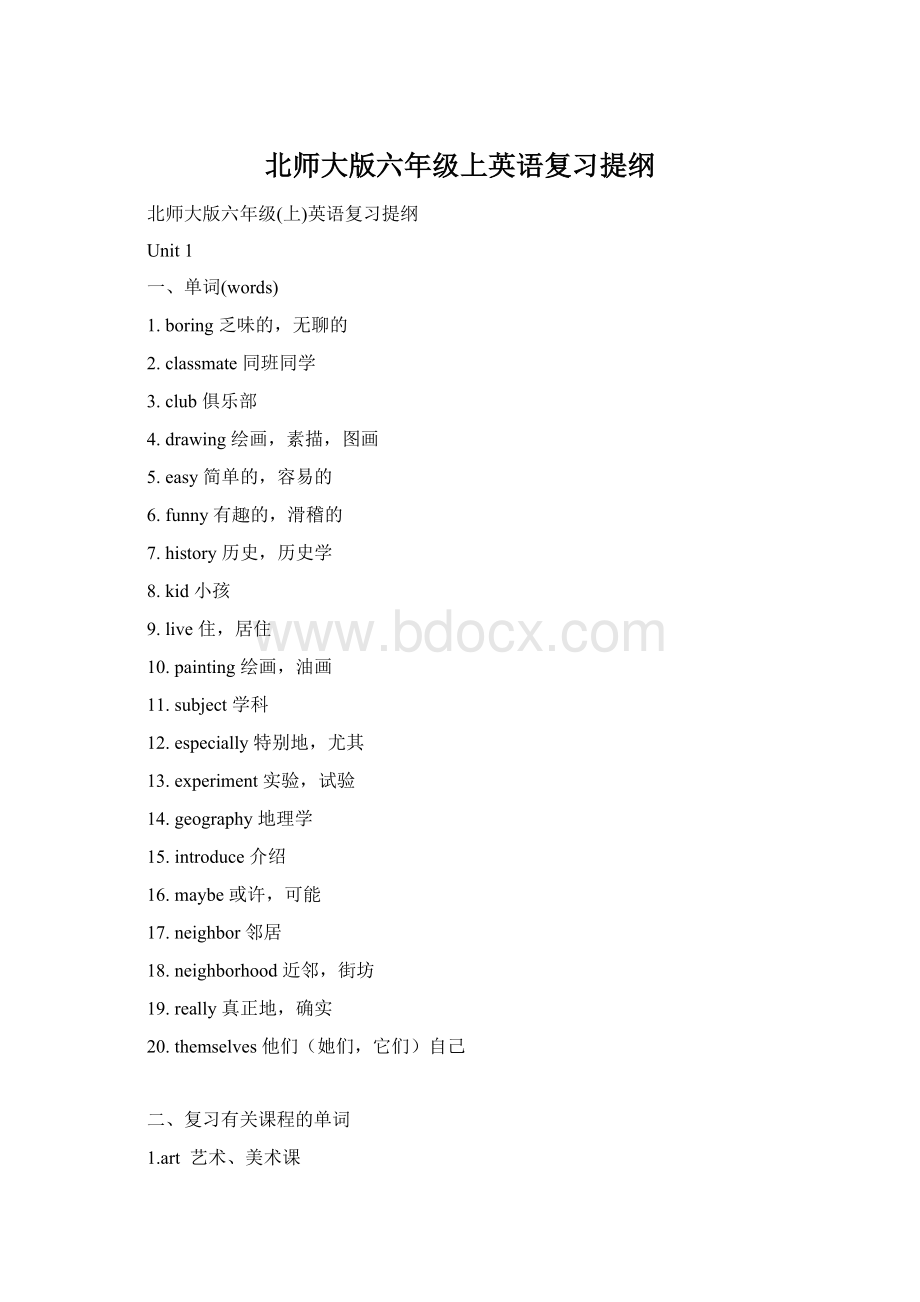北师大版六年级上英语复习提纲Word文档下载推荐.docx
《北师大版六年级上英语复习提纲Word文档下载推荐.docx》由会员分享,可在线阅读,更多相关《北师大版六年级上英语复习提纲Word文档下载推荐.docx(15页珍藏版)》请在冰豆网上搜索。

themostboringsubject最无趣的学科
2.talkabout…谈论
e.g.Theyaretalkingabouttheirfavoritesubjects.
3.havefun玩得开心
havefunwith做…很开心,和…玩得开心,愉快参与到…中
e.g.TheBINGOkidsarehavingfun.
Youcanhavefunwithyourkid.
You'
llhavealotoffunwiththecreationstories.你能从读创世纪故事中获得快乐.
We’llhavelotsoffuntogether.
4.wantsb.todo…要某人做某事
wantsb.to…要某人去某地
e.g.BINGOkidswantAnnandKentojointheirclub.
Charlie’smomwanthimtoschoolonSaturday.
5.olderbrother哥哥
youngerbrother弟弟
fat(fatterfattest)wet(wetterwettest)
(4).以“辅音字母+y”结尾的形容词,将y变为i,加-er构成比较级,加-est构成最高级
funny(funnierfunniest)
(5).其它双音节和多音节形容词,前面加more
构成比较级,前面加themost构成最高级
interestingboringexcitingdifficult
3.记住一些英语中的反义词
big
small
cheap
expensive
easy
difficult
boring
Interesting
girl
boy
hot
cold
long
short
thin
Fat
young
old
fast
slow
first
last
early
late
happy
sad
4.能够分清英语单词的词性
名词nounn.
代词pronounpron.
动词verbv.
形容词adjectiveadj.
副词adverbadv.
5.复习动词的单、复数形式和用法
(1).一般情况加-s
readwriteworkcome
(2).以[s][ʃ][tʃ]音素结尾或以字母-o结尾的动词,加-es
pass(passes)push(pushes)watch(watches)
do(does)go(goes)
(3).以“辅音字母+y”结尾的动词,亦y为i,再加-es
Study(studies)try(tries)fly(flies)apply(applies)
Unit2
一、单词
1.busy忙碌的
2.chore家务
3.dochores做家务
4.dish盘子
5.dust掸去,刷去(灰尘)
6.feed喂(养),饲(养)
7.feel感觉,感受
8.grass草
9.homework家庭作业
10.once一次,一回
11.twice两次,两回
12.once(twice)aweek每周一次(两次)
13.plant植物
14.polish擦(鞋),刷(鞋)
15.street街道
16.tell告诉
17.think认为,以为
18.trash垃圾
19.furniture家具
20.never从不,决不
21.person人
二、短语
1.makethe(my)bed铺床
2.cleanthe(my)room打扫房间
3.walkthedog遛狗
4.everyweek(day)每周(天)
5.everymorning每天早晨
6.onSundays在星期天
7.wanttodo...想要做某事
8.nextday第二天
9.hardlyever很少,几乎不
10.beforeschool上学前
11.dohomework做家庭作业
12.dochores做家务
13.washthedishes洗盘子
14.feedthefishes喂鱼
15.cutglass割草
16.watertheplants给植物浇水
17.polishtheshoes擦鞋
18.takeoutthetrash倒垃圾
三、重点句型
1.询问某人必须做某事及回答
问:
What(chores/works)+do/does+代/名词+havetodo?
答:
代/名词+ have/hasto…..
e.g.
Whatchoresdoyouhavetodo?
Ihavetomakemybedeveryday.
Whatchoresdosehehavetodo?
Hehastofeedthefisheseveryday.
2、否定句(不必)
don’t/doesn’t+haveto
e.g.Idon’thavetofeedthefisheseveryday.
Hedoesn’thavetowatertheplantseveryweek.
四、语音
掌握字母y在单词结尾(辅音字母+y)的发音[i];
easydirtyjuicytinynoisysleepy
五、语法
1.频度副词的基本用法:
副词+动词:
always,usually,often,sometimes,hardlyever,never
句子最后:
once/twiceaweek/month/year,onSundays/Mondays/。
。
Shehardlyeverdoesherhomework.
Mybrotherusuallymakesbreakfast.
WeneverdochoresonSundays.
Ifeedthefishesonceaday.
Unit3
1.bowing保龄球
2.cool很棒的,极好的
3.find寻找;
找到
4.gym体育馆,健身房
5.ice-skate滑冰,溜冰
6.learn学习
7.ski滑雪运动
8.sometimes有时
9.workout锻炼,做运动
10.information信息,消息
11.invitation邀请,请帖
12.karate空手道
13.partner伙伴,搭档
14.receive收到,接受
15.sound听起来,听上去
二、短语
1.goswimming去游泳
2.goshopping去购物
3.threetimesaweek一周三次
4.afterschool放学后
5.attenthirtyonMonday在周一的10点半
6.playtheguitar弹吉他
7.singsongs唱歌
8.haveaskiclass上(有)滑雪课
9.workoutatthegym去健身房做运动
10.goskiing去滑雪
11.dokarate玩空手道
12.playfootball踢足球
13.playtennis打网球
1.问将来会发生什么事及回答
(1).问:
what+be动词+人称+doing…+将来时间?
(表示最近即将发生)
答:
人称+be动词+doing…+将来时间
e.g.Whatareyoudoingtomorrow?
Iamplayingtennistomorrow.
(2).问:
whatwill+人称+do…+将来时间?
人称+will+do….
e.g.WhatwillyoudoonnextSaturday?
Iwillgotoseeamovie.
(3).问:
what+be动词+人称+goingtodo…+将来时间?
人称+be动词+goingtodo….
e.g.WhatareyougoingtodoonnextSaturday?
I’mgoingtoseeamovie.
2.询问事情发生的频度及回答
Howoften+do/does+人称+do…?
频度副词
e.g.Howoftendoyouplayfootball?
Onceaweek.
Iplayfootballonceaweek.
Ihardlyeverplayfootball.
Never.
1.了解字母s在单词中的发音,并能正确区分它们的不同发音。
[ʒ]:
usuallycasualtelevisiontreasure
[s]:
classalwaysSunday
[z]:
isclassesmissthistrees
2.了解字母ge在单词中的发音。
garage
1.能够理解并初步运用“be+doing+将来时间状语”表示最近
e.g.Whatareyoudoingtommrow?
I’mplayingtennis.
2.在…时间的表示方法
in:
inthemoring/afternoon/evening
on:
onMonday/Tusday…..
at:
atnight
at10:
00/….
Unit4
1.baseball棒球
2.belt皮带
3.buy购买
4.cost值(多少钱),花费
5.glove手套
6.idea想法,注意
7.intheend最后,结果,最终
8.mall大规模购物中心
9.pop(口语)大众的,流行的
10.popcorn爆米花
11.prefer更喜欢,选择
12.spend花费(时间)
13.sunglasses太阳镜
14.pair
(一)双,对,副
15.latest最新的,最近的
16.people人,人民,人们
17.quick快,迅速
18.style风格,样式
19.sweatpants宽松的运动裤
20.videogame电子游戏
1.goodidea好注意
2.popmusic流行歌曲
3.apairofsunglasses一副太阳镜
4.playavideogame玩(打)电子游戏
5.likeshopping喜欢购物
6.hateshopping讨厌购物
7.jazzmusic爵士乐
8.lovesskiing喜欢滑雪
三、重点句型(四会)
1.询问某物售价及回答
Howmuch+do/does+名词+cost?
代/名词+cost/costs+金额
金额
e.g.HowmuchdoesthisT-shirtcost?
Itcosts$15.
$15.
Howmuch+be+名词?
代/名词+be+金额
e.g.HowmuchisthisT-shirt?
It’s$15.
2.询问在一个范围内的选择并回答
Which+名词+do/does+人称+prefer?
人称+prefer+选中物品
选中物品
e.g.Whichsunglassesdoyouprefer?
Ipreferthegreenone.
Whatkindof+名词+do/does+人称+prefer?
选中物品
e.g.Whatkindofmusicdoeskenprefer?
HeprefersJazzmusic.
2.询问对某物/事的评价并回答
Howabout+名词?
e.g.Howaboutthesesunglasses?
Yes,they’regreat.
HowaboutMath?
It’stoodifficult.
初步掌握[s]和[z]在单词中的不同发音。
isclassesmissthistreessneeze
1.在具体语境中理解并会使用表示远近、单复数的单词
近
远
单数
this
that
复数
these
those
Unit5
1.check检验,核查
2.dentist牙医
3.dizzy头晕的
4.give(过去式gave)给,给与
5.glad高兴的,快活的
6.press按,压
7.tired累的,疲倦的
8.turnon打开
9.weekend周末
10.work工作,干活
11.mouse鼠标
12.disk磁盘
13.harddisk硬盘
14.speakers音箱
15.screen屏幕
16.toothache牙痛
1.accident事故
2.advice建议
3.angry发怒的,生气的
4.bored感到无聊的
5.deep深的,深沉的
6.explain解释,说明
7.manual使用说明书
8.medicine药物
9.problem问题,麻烦
10.switch开关
11.sure确信的,有把握的
12.understand理解,明白
13.printer打印机
14.keyboard键盘
15.scared吃惊的,害怕的
1.feeldizzy感到头晕
2.feelscared感到害怕
3.feelcold感觉到冷
4.feeltired感觉到累
5.haveaheadache头痛
6.haveatoothache牙痛
7.haveaproblem有麻烦
8.havenoidea没有主意
9.workhard努力工作
10.beangrywithsomeone和某人生气
11.takesomemedicine吃药
12.goodidea好主意
1.用should表达建议的结构和用法
Whatshould+代/名词+动词原型…?
代/名词+should+动词原型
e.g. Ihaveatoothache.WhatshouldIdo?
Youshouldvisitthedentist.
(2).不应该做什么
e.g.Youshouldn’teatfastfood.
1.用should表达建议的结构和用法
2.初步了解、掌握不定冠词a和an的用法
an:
后跟首字母为元音[aeiou]的名词
e.g.anapple/octopus/orange/egg
a其它名词使用a,如果首字母为元音的名词前加上了首字母为辅音字母的形容词,也使用定冠词a
e.g.acompute/redumbrella/brownegg
Unit6
1.city城市
2.Japan日本
3.inJapan在日本
4.lake湖泊
5.lesson课,功课
6.Internet互联网
7.Italy意大利
8.Mexico墨西哥
9.mountain山,山脉
10.pollution污染
11.pyramid金字塔
1.getane-mailfrommyfriend
收到朋友的电子邮件
2.writeane-mailtomyfriend
给朋友写电子邮件
3.havealook看
(一)看
二、重点句型
1、询问某人来自哪个国家或地区并回答
Wherebe+代/名词+from?
代/名词+be+from+国家/地区。
e.g.Whereisyourfriendfrom?
HeisfromItaly.
Whereareyoufrom?
I’mfromChinese.